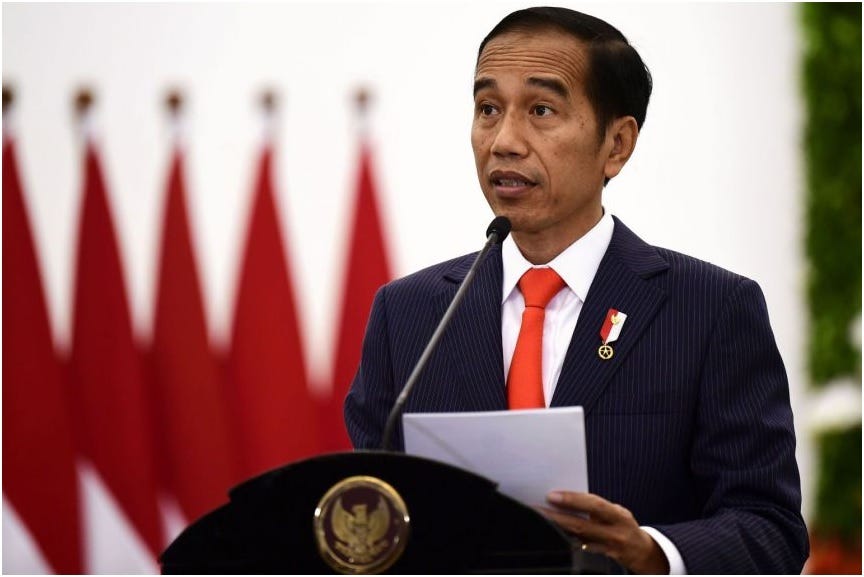[ad_1]

Indonesian President Joko Widodo has shocked local multinational interests with a flamethrowing speech in Jakarta telling the country’s 270 million people to “love local products” and “hate foreign products” in a national speech to the Indonesian Trade Ministry that is being interpreted as encouraging a xenophobic campaign against imports.
In the March 4 speech, he used the word “benci,” or “hate,” that is being remarked upon by Indonesians themselves as quite harsh and impolite. “It is a stunning use of language,” said a businessman.
It is also a considerable turnaround from the passage of a massive Omnibus bill Jokowi’s government pushed through the legislature in October, leaving the business community in deep confusion over what the government wants. That streamlined foreign investment and domestic labor laws to allow for dramatically increased foreign investment and to make it easier for companies – both foreign and domestic – to get rid of unproductive workers. The bill eased the process of obtaining business permits and investment over the bitter objections of labor unions, environmental organizations and anti-corruption crusaders.
Interest rates have also been cut for exporters, energy tariffs have been reduced for labor-intensive industries, tax incentives have been granted for investment in special economic zones.
It is uncertain what effect the president’s words will have, for instance if they will be followed up with legislation that would undo some of the provisions of the Omnibus bill. But said one foreign businessman: “He was speaking to the Ministry of Trade, so it is certainly an instruction to maintain restrictions.” In the speech, he ordered the Ministry of Trade to put policies and strategies in place to market local products including by placing micro, small and medium enterprises in what he said were strategic places and moving foreign consumer products to out-of-the-way shelves to make way for domestic ones.
Muhamad Lutfi, the minister of trade, quickly moved to clarify Jokowi’s remarks, saying the president has no intention of being a protectionist, as protectionism will not improve Indonesia’s prosperity, and he fully supports international trade, with 25 trade agreements with other countries. He said the term “hate foreign products” referred to the practice of predatory pricing such as subsidies and dumping in order to drive small businessmen out of business. Some foreign companies, he said, use predatory pricing to shut down domestic businesses and SMEs.
Virtually since his first-term election in July 2014, the president has swung between a nationalistic philosophy of restricting investment and restricted foreign companies from handling government construction projects, and inviting in foreign business interests that have kept the multinational community in a state of uncertainty. He was said to have been shocked in 2019 by a World Bank report that found the country is cut out of global supply chains, meaning FDI is going to other countries partly because of costly, time-consuming and discretionary non-tariff measures, confusing regulations and a hostile bureaucracy. Restrictions on work permits for highly skilled professionals mean multinationals can’t bring in critically required staff, the world bank found, and import tariffs limited the import of key inputs for manufacturing. Rules were said to be discretionary and inconsistent, leaving Indonesia far behind other ASEAN countries in luring investment.
The president’s second term, a source said, was supposed to be a victory lap on infrastructure including the construction of a new national capital in Kalimantan on the island of Borneo. That now is expected to be postponed to as long as 2035. It is lagging behind the rest of the region on the response to the Covid-19 crisis.
The country has indeed been hit hard by the Covid-19 coronavirus crisis, with at least 1.36 million people infected and nearly 37,000 dead although both figures are believed to be undercounts. Critics have accused the government of mismanagement, with officials at the onset of the pandemic saying they thought Allah would protect them, then botching lockdowns across the country.
Gross domestic product shrank by 2.19 percent in the fourth quarter of 2020 after a 3.49 percent slump in the previous quarter according to the country’s statistics bureau. An existing policy to lower imports because of the pandemic has kept their trade surplus in check despite the recession.
According to one source, they are taking it out on foreign interests. “It is part of the general rise in anti-foreign sentiment,” he said. “They say they want more investment and yet they talk about hating foreign products in harsh language. They are using their old playbook of suspicion against foreigners.” Indeed, in the wake of the coronavirus crisis the government has banned foreigners from entering the country except for holders of residence permits and are not processing new work permits. They have also banned foreign residents from receiving inoculations against the coronavirus, including those in companies allowed to buy vaccines for their employees. Foreign workers in those companies won’t be allowed to get the vaccines.
While the country overall isn’t dependent on foreign imports, there are scores of products that Indonesia simply can’t do without. Despite desultory attempts to foster a domestic auto industry, 96.3 percent of cars and trucks sold in Indonesia in 2019 were from Japanese brands – an even higher proportion of Japanese brands than are sold in Japan itself, either imported completely built up from knockdown kits. Despite its size as Southeast Asia’s biggest economy, it really has almost no heavy industry. Its most popular food, Indo Mie noodles, are made entirely of imported wheat. All of its garlic is imported from China, its silicon chips from elsewhere, cotton for all clothing is virtually all imported. Tempeh, a popular fermented soybean product, is made 90 percent from imported soybeans.
This article is among the stories we choose to make widely available. If you wish to get the full Asia Sentinel experience and access more exclusive content, please do subscribe to us.
[ad_2]
Source link